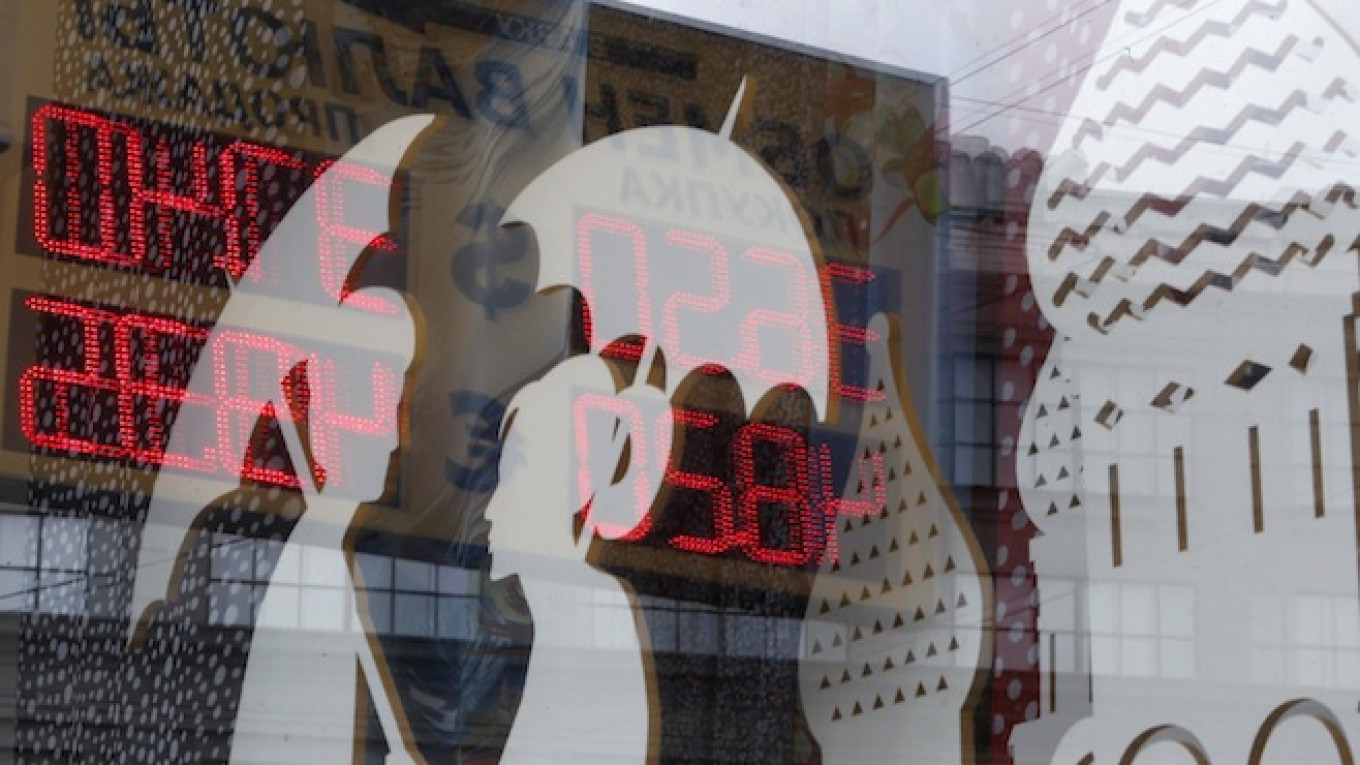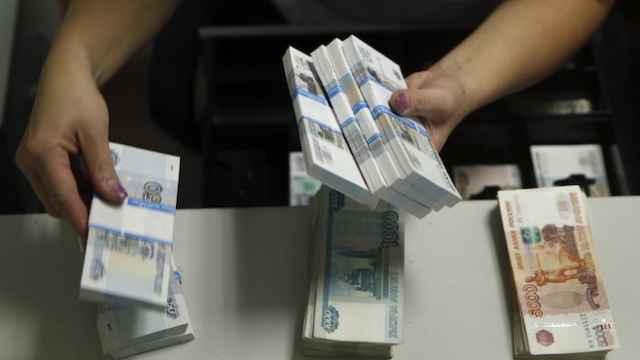Russia's ruble plunged again on Friday, and traders said the Central Bank intervened heavily to slow its slide, as oil prices dropped and Russian companies locked out of international capital markets drove demand for dollars.
The Central Bank says it has spent $3.3 billion defending the ruble between last Friday and Wednesday, but the total amount over the past week is likely to be far larger, since the bank releases its intervention data with a two-day lag.
The ruble has been pressured for months by a plunge in prices for oil, one of Russia's chief exports. Western sanctions over the Ukraine crisis and dollar strength linked to speculation the U.S. Federal Reserve will raise interest rates have also taken their toll.
Early on Friday, the bank said it had shifted the ruble's floating corridor on Thursday, but the currency breached the new limits within the opening minutes of trading before extending losses.
"The market is being driven by demand for foreign currency, which is being unconvincingly countered by the Central Bank shifting the boundaries of its currency corridor," Vladimir Yevtisfeyev, a financial analyst at Bank Zenit in Moscow, said in a note.
Sanctions over Ukraine mean that dollars and euros are in short supply as major Russian firms are shut out of Western capital markets but still need foreign currency to service their overseas debts. Russian companies and banks have some $50 billion in external debt repayments due in the fourth quarter, according to the Central Bank.
The ruble has lost around 18 percent against the dollar this year, and the Central Bank has spent more than $40 billion in interventions, the bulk of which came in March when the Ukraine crisis escalated.
The Central Bank said early on Friday that it had shifted the boundaries of its floating ruble corridor 15 kopeks higher to 36.00-45.00 against a dollar-euro basket as of Oct. 9 and had spent $1.5 billion in interventions on Wednesday.
Downward Spiral
The ruble broke through the Central Bank's new boundaries straight after trading began, later hitting a low of 45.26 against the basket.
The Central Bank automatically intervenes to defend the ruble once it crosses the boundaries of its trading band. It moves the band by 5 kopeks once it has spent $350 million in forex interventions. That implies the bank spent around $1 billion in additional forex interventions on Thursday.
The ruble was 0.62 percent weaker against the dollar at 40.39 at 6:30 p.m. after touching a record low of 40.46. It lost 0.1 percent to trade at 50.98 versus the euro.
Traders said the Central Bank continued to intervene heavily in the currency market on Friday and had probably shifted its ruble corridor by another 20 kopeks. Alfa Bank analysts estimate the bank sold around $2 billion in foreign currency to support the ruble on Friday.
"For the moment, the prospects for the ruble don't look promising," said Dmitry Polevoy, chief economist for Russia and CIS at ING Bank in Moscow.
"If oil prices stay around $90 a barrel until the end of the year, then net capital outflows could exceed the current account surplus by at least $5 billion, which could force the Central Bank to move the top of the corridor to 45.70."
Weaker oil prices were a major drag on both the currency and stocks on Friday, with Russia's two main share indexes down more than 1 percent. Futures for international crude benchmark Brent tumbled over $1 to below $89 a barrel on Friday, their weakest since 2010.
The dollar-denominated RTS share index was down 2.2 percent at 1,065 points. Its ruble-based peer MICEX was 1.3 percent lower at 1,366 points.
Russia's top lender, Sberbank, was down 0.2 percent. The country's largest oil producer, Rosneft, fell 2.6 percent.
A Message from The Moscow Times:
Dear readers,
We are facing unprecedented challenges. Russia's Prosecutor General's Office has designated The Moscow Times as an "undesirable" organization, criminalizing our work and putting our staff at risk of prosecution. This follows our earlier unjust labeling as a "foreign agent."
These actions are direct attempts to silence independent journalism in Russia. The authorities claim our work "discredits the decisions of the Russian leadership." We see things differently: we strive to provide accurate, unbiased reporting on Russia.
We, the journalists of The Moscow Times, refuse to be silenced. But to continue our work, we need your help.
Your support, no matter how small, makes a world of difference. If you can, please support us monthly starting from just $2. It's quick to set up, and every contribution makes a significant impact.
By supporting The Moscow Times, you're defending open, independent journalism in the face of repression. Thank you for standing with us.
Remind me later.






